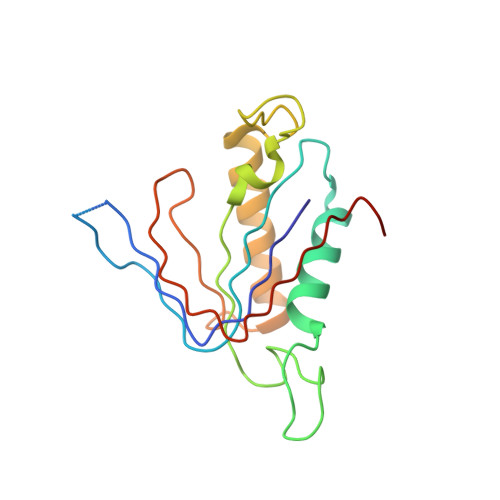Ligand-bound Structures Provide Atomic Snapshots for the Catalytic Mechanism of D-Amino Acid Deacylase
Bhatt, T.K., Yogavel, M., Wydau, S., Berwal, R., Sharma, A.(2010) J Biol Chem 285: 5917-5930
- PubMed: 20007323
- DOI: https://doi.org/10.1074/jbc.M109.038562
- Primary Citation of Related Structures:
3KNF, 3KNP, 3KO3, 3KO4, 3KO5, 3KO7, 3KO9, 3KOB, 3KOC, 3KOD - PubMed Abstract:
D-tyrosyl-tRNA(Tyr) deacylase (DTD) is an editing enzyme that removes D-amino acids from mischarged tRNAs. We describe an in-depth analysis of the malaria parasite Plasmodium falciparum DTD here. Our data provide structural insights into DTD complexes with adenosine and D-amino acids. Bound adenosine is proximal to the DTD catalysis site, and it represents the authentic terminal adenosine of charged tRNA. DTD-bound D-amino acids cluster at three different subsites within the overall active site pocket. These subsites, called transition, active, and exit subsites allow docking, re-orientation, chiral selection, catalysis, and exit of the free D-amino acid from DTD. Our studies reveal variable modes of D-amino acid recognition by DTDs, suggesting an inherent plasticity that can accommodate all D-amino acids. An in-depth analysis of native, ADP-bound, and D-amino acid-complexed DTD structures provide the first atomic snapshots of ligand recognition and subsequent catalysis by this enzyme family. We have mapped sites for the deacylation reaction and mark possible routes for entry and egress of all substrates and products. We have also performed structure-based inhibitor discovery and tested lead compounds against the malaria parasite P. falciparum using growth inhibition assays. Our studies provide a comprehensive structural basis for the catalytic mechanism of DTD enzymes and have implications for inhibition of this enzyme in P. falciparum as a route to inhibiting the parasite.
Organizational Affiliation:
Structural and Computational Biology Group, International Centre for Genetic Engineering and Biotechnology, Aruna Asaf Ali Road, New Delhi, 110067, India.















